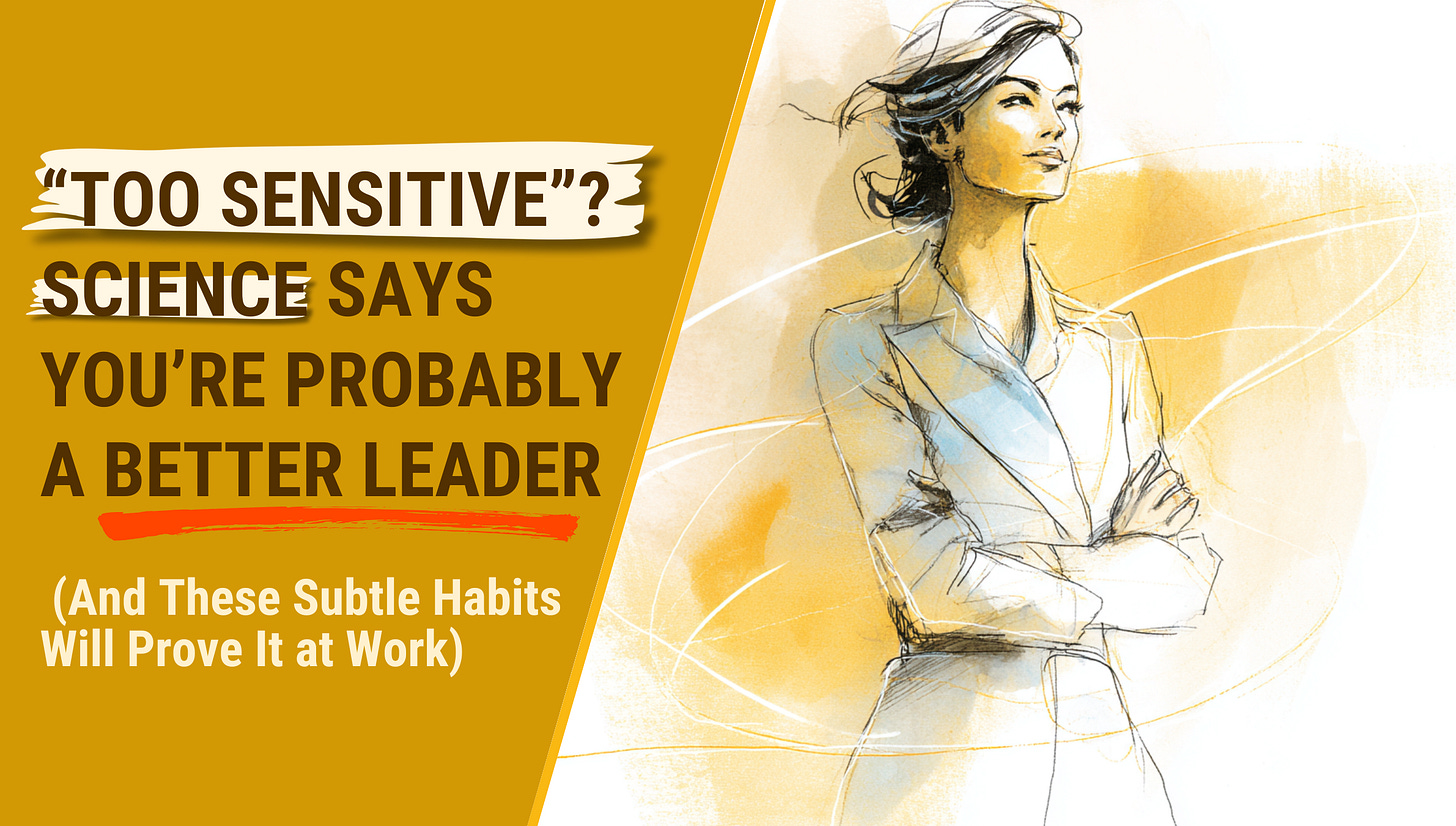“Too Sensitive”? Science Says You’re Probably a Better Leader
(And These Subtle Habits Will Prove It at Work)
Welcome to Linked And Lift, your weekly guide to thriving in your career and designing a life you love for entrepreneurs and ambitious professionals. Each week, you get research-backed insights and we break down the skills, strategies, and mindsets you need to stay ahead of the curve.
I’m always refining this newsletter to make sure you get the most useful, relevant insights for your growth.
Take 15 seconds here to make sure the next editions speak directly to you.
I still remember the first time someone called her “too sensitive.”
She was 11.
She’d raised her hand in class after a joke landed wrong. Calm, clear, and respectful. But still. The teacher rolled their eyes.
“You’re too sensitive. Don’t take things so personally.”
It was subtle, but it stuck.
And for many women, that message isn’t a one-time moment. It’s a pattern.
We start to question our intuition.
We wonder if we’re overreacting.
We begin to shrink.
But what if “too sensitive” was not the flaw we thought it was?
Here’s what’s in store:
A story that reframes “too sensitive” from flaw to fuel
Science-backed proof that emotional depth is a strength
Practical ways to use your awareness as a leadership tool
Read Time: 5 minutes
Let’s talk about what sensitivity really is:
Sensitivity = Self-Awareness
Sensitivity isn’t a flaw. It’s intelligence.
💡 It’s noticing what others miss
💡 It’s sensing energy shifts before words are spoken
💡 It’s leading with emotional attunement, not just logic
In other words?
It’s a leadership advantage.
What the Research Says:
🔹 Emotional Self-Awareness Is Real (and Women Lead Here)
A study of 5,000+ participants found that women aren’t just perceived to be more emotionally aware. They actually are. They pick up on micro-expressions, vocal shifts, and unspoken tension faster and more accurately.
🔹 The Brain Responds Differently to Emotion
FMRI studies show women’s brains process emotional stimuli more deeply, especially social cues like rejection, anger, or disappointment.
This means women are often faster at reading the emotional temperature in a room. This isn’t fragility. It’s a huge asset in leadership and communication.
🔹 This depth of emotion is not fragility. It’s resilience, Not Weakness
Those with high emotional awareness build deeper relationships, resolve conflict with more care, and build trust. That’s not a liability. That’s legacy-level leadership.
What Sensitivity Looks Like in Practice:
Here’s how sensitivity shows up as strength, every day:
💡 You sense tension before it escalates
→ That’s emotional radar.
💡 You notice subtle shifts in tone or body language
→ That’s intuitive intelligence.
💡 You connect authentically, not transactionally
→ That’s what builds trust and loyalty, in teams, friendships, and communities.
🧭 You sense when a meeting is going off track, and redirect with grace
💬 You speak up for someone who’s being dismissed, because you feel their discomfort
🔐 You set boundaries early, not out of anger, but out of self-respect
None of that is weakness. It’s wisdom in action.
These aren’t soft skills. They’re strategic ones.
Action Plan: Lead With Your Sensitivity
Notice your patterns.
Track when your emotional awareness shows up. It’s more often than you think.If someone says, “You’re too sensitive…”
say, “I’m self-aware. And that helps me notice what others overlook.”Name your gift.
Instead of calling yourself “overly sensitive,” try “highly intuitive,” “emotionally intelligent,” or “deeply perceptive.”Practice micro-boundaries.
Your awareness means you often absorb the energy of others. Build quick-reset practices into your day: a walk, a breath, a moment alone.Use it in your leadership.
Whether you lead a team, a brand, or your own life — your ability to feel is also what helps others heal.
Linked & Lift Picks
📘 Book: Emotional Agility by Susan David - master your inner world to lead outer success
🎧 Podcast: Dare to Lead with Brené Brown - especially episodes on empathy & brave conversations
💬 Quote: “The future belongs to those who can feel deeply and lead clearly.” – Unknown
Final Thought
The world doesn’t need less sensitivity.
It needs more leaders who can listen deeply, speak with compassion, and act with integrity.
If that’s you, own it.
And if you’ve been told to “tone it down” or “grow thicker skin”,
maybe what you really need is to double down on your awareness.
Because the very thing you were told to shrink might be the thing that makes you unforgettable.
📩 Share the Lift: Know someone who needs this message? Share this newsletter with them to help them.
⭐ Rate This Edition: Your feedback shapes Linked And Lift! Let me know what you want to see more of.
I’d love to know this:
👉 What’s one time your emotional awareness made a difference, in a conversation, a project, or a relationship?
Have you ever been called “too sensitive”?
How did it shape your self-perception?
Hit reply. I’d love to hear your story.
And thank you for being a part of our Linked And Lift community!
Until next time,
Veronique Barrot
Founder, Linked And Lift
Coaching leaders to grow from the inside out.
Follow me on LinkedIn
P.S. If you’re building a personal brand on LinkedIn and often find yourself second-guessing your voice or direction, you’re not alone.
I help ambitious, mission-driven female leaders like you, get clear on your positioning and messaging, and grow your presence on LinkedIn, in a way that’s strategic, sustainable, and aligned with who you are - so you can lead with clarity and confidence, and attract the right opportunities for you or your business.
✨ If you’d love more guidance on that journey, you’re welcome to apply.















As a sensitive leader, this gives me so much reassurance. There is still the stigma at times that being sensitive is weakness, but in reality, I have found it to be one of my greatest strengths as a leader.